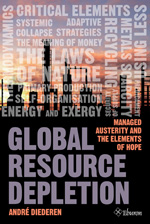shhh It’s Jam Band Friday – http://www.youtube.com/watch?v=hntXAO_Rq7c
OK so which is it, are we running out of stuff or not? Is 6 Billion people too many or not? Have we cut down way too may trees or not? I believe these answers are knowable. Are the Ocean’s fished out or not? Is Global Warming happening? The issue seems to be Price. If Global Warming were happening then carbon would be expensive. But what if price isn’t the issue when capitalists and nations treat resources as if they were “free”.
:} http://www.youtube.com/watch?v=U9sraruD8ho&feature=related :}
http://www.planetthoughts.org/?pg=pt/Whole&qid=3267
Blog item: Recycling? What A Waste.
By Jim Fedako
This fall, school kids across the country will again be taught a chief doctrine in the civic religion: recycle, not only because you fear the police but also because you love the planet. They come home well prepared to be the enforcers of the creed against parents who might inadvertently drop a foil ball into the glass bin or overlook a plastic wrapper in the aluminum bin.
Oh, I used to believe in recycling, and I still believe in the other two R’s: reducing and reusing. However, recycling is a waste of time, money, and ever-scarce resources. What John Tierney wrote in the New York Times nearly 10 years ago is still true: “Recycling may be the most wasteful activity in modern America.”
Reducing and reusing make sense. With no investment in resources, I can place the plastic grocery bag in the bathroom garbage can and save a penny or so for some more-pressing need. Reducing and reusing are free market activities that are profitable investments of time and labor.
Any astute entrepreneur will see the benefit of conserving factors of production. Today, builders construct houses using less wood than similar houses built just 20 years ago. In addition, these houses are built sturdier; for the most part anyway.
The Green’s love for trees did not reduce the amount of wood used in construction; the reduction was simply a reaction to the increasing cost for wood products. Using less wood makes financial sense, and any entrepreneur worth his profit will change his recipe to conserve wood through better design or by substituting less dear materials for wood products.
http://www.youtube.com/watch?v=pojL_35QlSI&feature=related
:}
http://www.energybulletin.net/stories/2010-10-20/global-resource-depletion
Global resource depletion

André Diederen’s recent book on resource depletion
I have been thinking, sometimes, that I could reserve a shelf of my library for those books which have that elusive quality that I could call “modern wisdom”. Books that go beyond the buzz of the media news, the shallowness of politicians’ speech, the hyper-specialization of technical texts. That shelf would contain, first of all, “The Limits to Growth” by Meadows and others; then the books by Jared Diamond, James Lovelock, Konrad Lorenz, Richard Dawkins, Peter Ward and several others that have affected the way I see the world.
I think I’ll never set up such a shelf, I have too many books and too few shelves; many are packed full with three rows of books. But, if I ever were to put these books together, I think that the recent book by André Diederen “Global Resource Depletion” would make a nice addition to the lot.
The subject of resource depletion, of course, is well known to readers of “The Oil Drum”. So well known that it is difficult to think of a book that says something new. Diederen, indeed, succeeds in the task not so much in reason of the details on the availability of mineral commodities that he provides, but for the innovative way he describes our relation to the subject. In other words, Diederen’s book is not a boring list of data; it is a lively discussion on how to deal with the implications of these data. It is a book on the future and how we can prepare for it.
To give you some idea of the flavor of the book, just a quote:
(p. 43) “… it isn’t enough to have large absolute quantities (“the Earth’s crust is so big”) and to have all the technology in place. (p. 33) … we have plenty of water in the Mediterranean or Atlantic Ocean and we have ample proven technologies to desalinate and pipe the water to the desert, so, why isn’t the Sahara desert green yet?”
This is, of course, the crucial point of resource depletion: what counts is cost, not amounts (I plan to use this example in my next talk!). Diederen is an unconventional thinker and he goes deeply into matters that, in some circles would be thought to be unspeakable; for instance (p. 41)
:}
Price? Really. More next week.
http://www.youtube.com/watch?v=3a9mx1IVZzU&feature=related
:}
